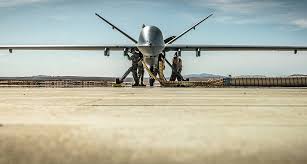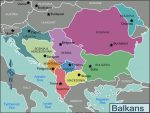Warfare is a part of society. it is a historical function of the state, which shapes collective identities, and as such, the spirit and values that pertain to warfare and the military exert broader social influence than just their effects on the successful conduct of war. The introduction of robotic warfare, especially of the use of drones, or “Unmanned Aerial Vehicles (UAVs)” introduces profound changes in the values, virtues and the way of thinking both of the military and of the society about the military. This change threatens the capacity of the military to serve as a repository of social values, in addition to being a mere instrument of warfare.
Soldiering as a profession and the army as an institution draw their legitimacy from the practical necessity of warfare, however they are also normative paradigms of important aspects of virtue in society. In many countries, the army commands more public confidence than any other institution, including the government. Where this is the case, it is so because of the virtue and organization that are traditionally ascribed to the army.
At least since Aristotle, who understood the professions as the foundation of social stratification, or the layering of society into social classes, certain virtues have been traditionally associated with certain professions. According to Aristotle, not every virtue is equally important or necessary in every profession; thus courage will play a key role in the military, but not amongst the tradesmen; empathy will be a key value for the medical profession, but not necessarily for builders; discipline and self-denial are crucial for the army and the doctors, but not so much for entertainers and actors. The very existence of the professions is associated with particular social virtues that form the normative pillars of sociality as a whole.
The introduction of robotic warfare, and of drones in particular, invites great challenges to the virtues associated with the military profession. With the introduction of drone warfare, which is risk free for the drone operators, while being able to particularly effectively target and assassinate the targets of offensive drones, eliminate the necessity of traditional virtues for the military professions. One such virtue is courage. With drone warfare, soldiers no longer need to be brave. The consequences of this change for the society and the social role of the military are immense.
Similarly, drones eliminate the need for soldiers to be ascetic and disciplined, to be willing to make personal sacrifices for their country. This serious detracts from the honor and social value of the military profession and the military personnel.
The diminution of the price paid for something (in the case of warfare, of the risk associated with military operations) reduces the value of that “thing”. One wonders how much honor is left in modern warfare that is conducted by drones and is thus risk-free.
The introduction of drones into offensive military operations also reduces the value of the army as a repository of social virtue, and makes it similar, in organization and the skills required, to a corporation. Drone operators see their roles as “jobs”. In many armies, they go to work to operate lethal drones far away in the field, without residing in the barracks, without being placed in the battlefield, and are located in the cities and places of their ordinary residence, with their families, where they basically drive to work just like any corporate employee, operate drones and assassinate people far away, and then drive back home to spend time with their families. This practice turns military killing into a business like operation, and the military calling into a regular “job” for which no traditional military virtues are required. I am not saying that modern soldiers automatically lack courage or self-denial as a result of the introduction of offensive drones; however they no longer need those virtues and they are thus no longer cultivated in the military, because they are unnecessary. As I mentioned the social consequences of this change are extremely profound for the moral and social stature of the military.
A separate problem concerns the aesthetics of warfare. War is not just about achieving the military objectives; it is also about satisfying social values and strengthening collective identities, where a certain aesthetics of the military personality is important, where soldiers are seen as exemplary characters in society. With the introduction of drones, the drone operators no longer need to be soldiers in this traditional sense; they need not be exemplary characters in society in any way, and can in fact be quite deviant and unrepresentative of what the projections of social virtue is in a particular society. War is messy and bloody, however there is also an aesthetic ideal of warfare, which is closely intertwined with the ethical values inherent in the concept of honorable warfare: the horror of killing is also seen as the backdrop for the beauty of a military personality, the justice and proportionality in the military person’s values and decision-making. All of these aesthetic elements of warfare are obscured by the introduction of robotic weapons such as offensive drones.
On a moral spectrum, the use of drones has detracted from the value of human life by detaching the killer from the victim. For the drone operator, the victim who is hundreds of kilometers away, with whom there is no personal contact, is only a “target”. The “elimination” of these “targets” is appraised in terms of the drone operators competence and success: the more targets are eliminated, the more successful the drone operator is. In this context, the drone operator is cast in much the same light as a contract assassin.
The use of aerial bombardments and drone fire to kill people desensitizes society to the magnitude and tragedy of killing. This is clear from the response and the level of stigma attached to modern wars that are conducted mainly from the air and by long range artillery. For example, in the civil war in Bosnia (1991-1995) approximately 100 000 people died, over 50 000 of whom were combatants, or soldiers. Thus, in four years of largely “organic” warfare (without the major use of aerial warfare, with war taking place between ethnic groups on the ground), the overall number of the civilian victims was slightly below the overall number of victims amongst the combatants. Yet, this has been one of the most severely stigmatized war in recent European history because of its lethality and the largely personal brutality exercised in the military operations.
The current war of Israel in Gaza, which at the time of the writing of this article has lasted just 8 months, has already seen close to 40 000 victims just on the Palestinian side, the vast majority of them civilians. This means that the war on Gaza, when it is adjusted for duration so far, is more than twice as lethal as was the war in Bosnia, and many more times deadly for the civilians as opposed to its lethality for the combatants, yet is has been considerably less stigmatized than the war in Bosnia, because it is conducted primarily by robotic means or by the air force and long range artillery. The victims, who die much more agonizing deaths than many of those killed in the Bosnian war, are less visible both to the killers and to the general public, and they are more distant because the killing is mediated by technology. This process dehumanizes the victims and makes it much easier for the soldiers to see them merely as targets, rather than as human beings. The human consequences of this psychological transition to killing mediated by technology (and by the AI) are truly abhorrent.
It would seem that due to the robotisation of warfare humanity is losing both the sense of value of human life and the perspective on military virtues; it has lost the military as a repository of social virtue and an important moral community within the society.



Very interesting! Thank you!